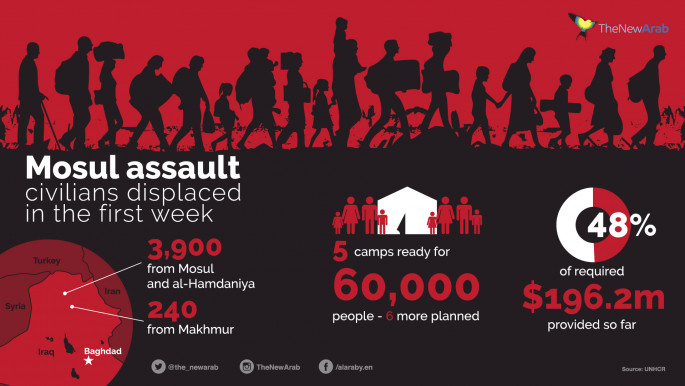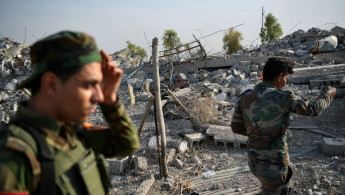#MosulOps: World powers meet as Iraqi forces near Mosul
Paramilitary forces were also massing near the battlefield to open a western front they say will aim to retake the town of Tal Afar and cut off routes to neighbouring Syria for Islamic State group fighters escaping Mosul.
Forces from the elite counter-terrorism service retook areas close to the eastern outskirts of Mosul, IS' last major urban stronghold in Iraq.
"On our front, we have advanced to within five or six kilometres (three to four miles) of Mosul," their commander, General Abdelghani al-Assadi, told AFP.
"We must now coordinate with forces on other fronts to launch a coordinated" attack on Mosul, he said, speaking from the Christian town of Bartalla.
Kurdish Peshmerga forces are making gains on the northeastern front but federal forces advancing from the south have some way to go before reaching the outskirts of Mosul.
Meanwhile, thousands of men from the Hashd al-Shaabi [Popular Mobilsation Forces], a paramilitary umbrella group dominated by Tehran-backed Shia militias, were preparing for a push to the west.
The militias' leadership has ordered "us to assume the mission of liberating the Tal Afar district", Jawwad al-Tulaibawi, spokesman for the Asaib Ahl al-Haq militia, said.
The Popular Mobilsation Force's mission will be to "cut off and prevent the escape of (IS) towards Syria and fully isolate Mosul from Syria," Tulaibawi told AFP.
"We expect that it will be a difficult and fierce battle."
Turkey threat
Involvement of Shia militias in the Mosul operation has been a source of contention, especially in eventual fighting inside the mainly Sunni city.
Iraqi Kurds and Sunni Arab politicians have opposed its participation, as has Turkey, which has a military presence east of Mosul despite repeated demands by Baghdad for the forces to be withdrawn.
 |
Tensions have been rising between Baghdad and Ankara, whose foreign minister, Mevlut Cavusoglu, warned Tuesday that his country would not hesitate to launch a ground operation.
"If there is a threat posed to Turkey, we are ready to use all our resources including a ground operation," he told Turkish channel Kanal 24.
Relations between the Popular Mobilsation Forces and the US-led coalition fighting IS are also tense, but the paramilitaries enjoy widespread support among members of Iraq's Shia majority.
Senior Iraqi and US military officials have reported that IS leaders are already attempting to leave Mosul to reach the Syrian side of their "caliphate".
But a senior official close to French Defence Minister Jean-Yves Le Drian said that a few hundred IS fighters recently moved in the opposite direction, reinforcing the estimated 3,000 to 5,000 militants defending Mosul.
"At this stage, we're noticing fighter movement from Syria to Iraq, not the other way around," the official said. "There is therefore a possible scenario in which Daesh (IS) resists to the end."
IS had shown increasing pragmatism in recent battles with a tendency to fall back in the face of superior firepower.
But with its claim to run a "caliphate" losing credibility with every new loss of territory, the group has mounted a fierce and well-organised resistance in the fight for Mosul, now in its second week.
On to Raqqa
Mosul is where IS supremo Abu Bakr al-Baghdadi proclaimed the cross-border "caliphate" in June 2014 and its loss could spell the end of the group's days as a land-holding force in the Iraqi part.
Le Drian was meeting with coalition counterparts, including Pentagon chief Ashton Carter, to review the war on IS after more than two years of coalition air strikes, training and on-the-ground military advice.
Besides coordinating their support for the forces closing in on Mosul, ministers will also attempt to iron out differences over priorities in the campaign.
France is keen to tackle the militants' Syria bastion Raqa, where a large number of French foreign fighters in IS ranks are stationed.
While the militants hunkering down in Mosul are outnumbered about one to 10, there are insufficient forces currently available to take on the estimated 3,000 to 4,000 IS fighters in Raqqa.
"The Syrian side is much more complicated. The forces available are limited," an adviser to the French defence minister said.
If and when Mosul is recaptured by Iraqi forces, Raqqa would be the only major city still in IS hands.





 Follow the Middle East's top stories in English at The New Arab on Google News
Follow the Middle East's top stories in English at The New Arab on Google News
![Israeli forces ordered bombed Gaza's Jabalia, ordering residents to leave [Getty]](/sites/default/files/styles/image_330x185/public/2176418030.jpeg?h=a5f2f23a&itok=_YGZaP1z)

